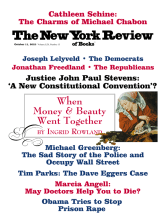In response to:
Can Anything Emerge from Nothing? from the June 7, 2012 issue
To the Editors:
Colin McGinn’s review of my 602-page book Incomplete Nature [NYR, June 7] focuses on a nontechnical, mostly heuristic use of “absence” from the first chapters and on my speculations about consciousness in the last chapters. He distorts, caricatures, and largely ignores nearly 80 percent of the book—in which I systematically reanalyze concepts as diverse as entropy, work, information, and the physics of life—in the process.
Apart from his churlish comments about my writing style and his self-assured pronouncement that there is no originality to my theory—which he never bothers to describe—he says that the central claim of the book is that dynamical systems theory can solve the riddle of consciousness. This would indeed be an unoriginal claim—suggested by many before me (he cites two)—but one that I dismiss in my book. He also rhetorically asks: “Does [Deacon] really think that biochemical molecules have real sensations and feelings (but not the atoms that compose them)?,” despite the fact that I repeatedly show why we cannot reduce either life or mind to material substrates. In dismissing the whole enterprise, he triumphantly exclaims: “We still don’t see how mere self-organization can generate the subjective character of conscious experience.”
Indeed, I begin Incomplete Nature by arguing that current dynamical systems theory is incapable of explaining life, much less mind. So I must admit to feeling a kind of vertigo at being criticized for holding ideas expressed by others that I explicitly challenge and endeavor to correct in my book. Ironically, in McGinn’s derisive accounts of ideas that he mistakenly believes to be mine, he actually challenges ideas that are proposed by Alicia Juarrero and Evan Thompson, whom he praises in the review.
What is completely obscured by his review is the fundamental distinction I draw between merely self-organizing processes, such as whirlpools and snow crystals, and what I call teleodynamic (i.e., end-directed) processes, such as those characterizing life. This explains why organisms violate properties of self- organization (such as the maximum entropy production principle) and can repair and reproduce themselves. This model system is also used to develop an account of the emergence of molecular (e.g., genetic) information and to develop a more comprehensive theory of natural selection, as well as provide hints about mental experience.
Although McGinn’s philosophical views are fundamentally challenged by the theories developed in Incomplete Nature, he at least owes readers an undistorted, if critical, account of this contrary view. Lacking this, you can always read the book and judge for yourself.
Terrence W. Deacon
Chair, Department of Anthropology
University of California, Berkeley
Berkeley, California
Colin McGinn replies:
I didn’t ignore the long middle chapters of Incomplete Nature, even approving them (see the last paragraph of my review). I did concentrate on the more distinctive claims of the book, however.
I fail to see how it can be “churlish” for a reviewer to complain about the bad prose style of an author if it is bad; and I did cite representative samples of Deacon’s turgid and unclear prose.
Deacon misses the point about cells and biochemical molecules. My objection is not that he is trying to reduce sentience to the material substrate. It is that he thinks that the teleological properties of such biological entities provide an adequate explanation of sentience. Adding “teleodynamics” to systems theory by no means closes the explanatory gap between mind and matter. If it did we would have to conclude that liver cells and amoebas are conscious, since they have teleological properties. I would have thought this was quite clear from my review. I note that in his letter Deacon now merely says that teleological properties of this primitive kind “provide hints about mental experience.” This is not what he claims in his book, and I am left wondering what kind of worthwhile “hints” he has in mind.
While I do cite Juarrero and Thompson as preceding Deacon, I never suggest that I agree with all their philosophical conclusions. This is quite consistent with praising them.
Deacon ends by saying that my philosophical views are “fundamentally challenged” by his theories. If by “challenged” he means “disagreed with,” that would seem true (though he never mentions me in the book); but if instead he means “actually brought into serious question,” then I must demur, for the reasons given. In any case, the grounds of my criticisms of his book are not that his philosophical views differ from mine, but are internal to his own efforts.
I wonder whether the absence of any “challenge” to my other criticisms indicates that Deacon can now see what is wrong with many of his other formulations, e.g., the use of the very notion of “incomplete nature.” One can but hope.



